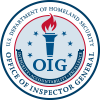
12,599
Open Recommendations
Open Recommendations
Age of Recommendations
3K Open Less Than 1 Year
6K Open Between 1-5 Years
2K Open More Than 5 Years
Date
Federal OIG
Report Title
Type: Type

National Endowment for the Arts OIG
Performance audit of the Maryland State Arts Council
Type:
Audit

Department of Homeland Security OIG
CBP's Deficient Mobile Device Management Places Information at Increased Risk - For Official Use Only
Type:
Audit

